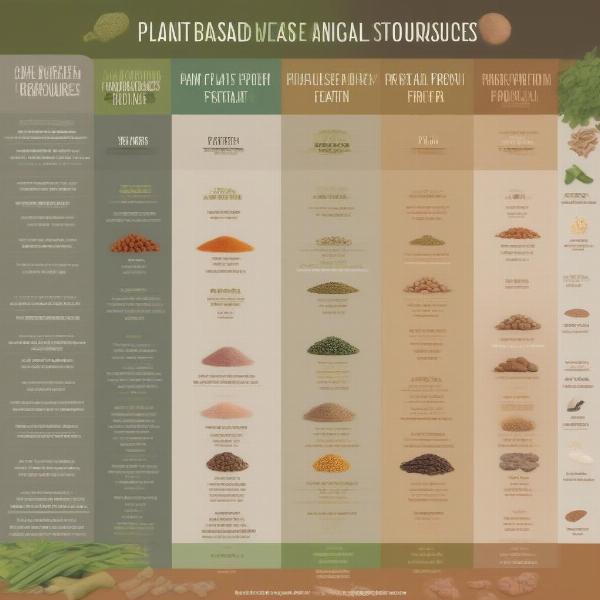Protein is an essential nutrient for dogs, playing a crucial role in their growth, development, and overall health. Understanding the role of protein in your dog’s food and choosing the right protein source is vital for responsible pet ownership. From supporting muscle growth to maintaining a healthy coat, protein feeds dog food provides the building blocks for a thriving canine companion. Choosing the right protein feed can be challenging, but this guide will help you navigate the options and make informed decisions for your furry friend.
What Role Does Protein Play in Dog Food?
Protein is a vital macronutrient for dogs, serving as the primary building block for muscles, tissues, organs, skin, coat, and even their DNA. Beyond these structural functions, protein also contributes to enzyme production, hormone regulation, and immune system function. Without sufficient protein, dogs can experience a range of health issues, including muscle loss, weakened immunity, poor coat quality, and stunted growth in puppies.
Different life stages require varying levels of protein. Puppies, for instance, need more protein for their rapid growth and development, while senior dogs might benefit from specific protein sources that are easier to digest. Understanding these nuances is key to tailoring a diet that meets your dog’s individual needs.
Choosing the Right Protein for Your Dog
The pet food market offers a wide array of protein sources, including common options like chicken, beef, lamb, and fish, as well as novel proteins like venison, kangaroo, and insect-based options. Each source offers a unique amino acid profile, digestibility, and potential for allergies.
Chicken and beef are popular choices due to their palatability and affordability, while fish offers benefits like omega-3 fatty acids. Lamb can be a good option for dogs with sensitivities to other proteins. Novel proteins are increasingly popular for dogs with allergies, as they are less likely to trigger a reaction.
When evaluating protein feeds dog food, consider your dog’s age, breed, activity level, and any existing health conditions. Consult with your veterinarian for personalized recommendations.
How Much Protein Does My Dog Need?
The amount of protein a dog needs varies depending on factors such as age, activity level, and health status. Growing puppies and highly active dogs require higher protein intakes than adult dogs with moderate activity levels. AAFCO (Association of American Feed Control Officials) provides minimum protein recommendations for dog food, but these are minimums, and individual needs may vary.
Protein Quality and Digestibility
Not all protein is created equal. Protein quality refers to the amino acid profile and digestibility of the protein source. A complete protein source contains all the essential amino acids a dog needs, while an incomplete protein source lacks one or more essential amino acids. Digestibility refers to how easily a dog’s body can break down and absorb the protein. Highly digestible protein sources are more efficiently utilized by the body.
Plant-Based Protein vs. Animal-Based Protein for Dogs
Both plant-based and animal-based proteins can be part of a healthy dog diet. Animal-based proteins are generally considered complete proteins, meaning they contain all the essential amino acids. Plant-based proteins can be incomplete, meaning they may lack certain essential amino acids. However, combining different plant-based protein sources can create a complete protein profile.
 Plant-based vs. Animal-based protein for dogs
Plant-based vs. Animal-based protein for dogs
Conclusion
Protein is a cornerstone of a healthy dog diet, crucial for everything from muscle development to immune function. Understanding the role of protein feeds dog food, choosing the right protein sources, and ensuring adequate intake are essential for responsible dog ownership. By considering your dog’s individual needs and consulting with your veterinarian, you can ensure your furry friend receives the optimal nutrition they need to thrive.
FAQs
- What are the signs of protein deficiency in dogs? Signs can include muscle loss, weight loss, poor coat quality, lethargy, and weakened immunity.
- Can I give my dog too much protein? While rare, excessive protein intake can strain the kidneys. It’s important to follow feeding guidelines and consult with your vet.
- Are grain-free dog foods always better? Not necessarily. Some dogs thrive on grain-free diets, while others do not. Consult your vet for personalized advice.
- What are novel proteins? Novel proteins are protein sources that are less common in dog food, such as venison, kangaroo, or insect-based protein.
- How can I tell if my dog is allergic to a specific protein? Symptoms of food allergies can include skin irritation, digestive upset, and ear infections. Consult your veterinarian for diagnosis and treatment.
- Is it okay to mix different protein sources in my dog’s food? Yes, mixing protein sources can provide a wider range of amino acids.
- How can I determine the protein quality in dog food? Look for AAFCO statements on the label and consult with your veterinarian.
ILM Dog is a leading international online resource dedicated to providing expert advice and practical information on all aspects of dog care and well-being. From breed selection and nutrition to training and health, we strive to empower dog owners worldwide with the knowledge they need to raise happy, healthy canine companions. We offer expert guidance on various aspects of dog care, including choosing the right protein in your dog’s diet. For expert advice tailored to your dog’s needs, contact us at [email protected] or +44 20-3965-8624. Visit ILM Dog for more information and resources.